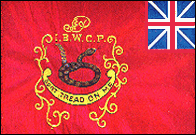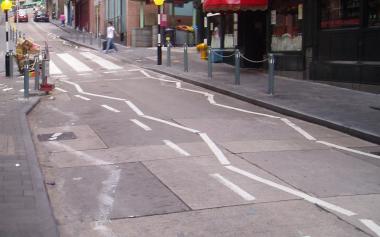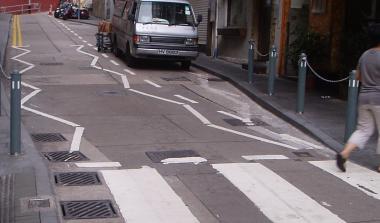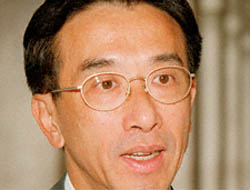


The Mid-Levels Escalator is less crowded than usual this morning, probably because so many people stayed up late last night for the riveting final game in the World Tiddlywinks Championship. Watching the Luxemburg versus San Marino clash from start to finish must have been almost as exciting as sleeping – the referee extending the game for hours in an attempt to get a result, and finally using a ouija board to declare a winner. One concession to entertainment apparently took place when the Luxemburg captain, noticing the referee’s back was turned, produced a chainsaw and decapitated one of his opponents.
It is comforting to think that we won’t have to put up with this tedium, and the curious spell it casts over millions of normal (not to say slightly dull) people for another four years. Of course, the Olympics will be along in 2008. But that will be in China – manned space launches will blow up, renegade provinces will declare independence, students will riot and be crushed by tanks. That will be worth staying up for.
None of this is of any concern to customers in Yuet Yuen Restaurant, where I arrive to find that shapely Administrative Officer Winky Ip has already ordered congee and noodles for both of us, and for a guest – an elegant woman in her mid-50s, dressed in an understated but well-tailored matching jacket and skirt, and rejoicing in the title Double-Up Assistant Director, Street Beautification and Safety Reduction (Island) CHAN Kwok Mei-fong, Mabel. I shake hands with her. “I just bumped into Mabel outside,” explains Winky, “so I invited her in. We worked together years ago when I was seconded to the Anti-Pedestrian Unit in the Transport Department.”
I have noticed them, but never really thought about it. “Are they,” I guess, “to stop people from parking vehicles next to the crossing?”
“Yes! Well done,” Mabel beams. “And why would we put them there?”
I think some more. “I suppose… I suppose because a vehicle parked right in front of a crossing might obstruct people’s view. Pedestrians and approaching motorists might not see each other until it’s too late.”
Mabel nods approvingly. “Exactly! Bright boy! Now, you see what we’ve done here,” she continues with a grin, pointing at the photos and clearly eager to share a major breakthrough in traffic management. “We have wrapped the zig-zags around new parking spaces right next to the crossings. We’ve distinctly increased the possibility that pedestrians, especially short ones, like schoolchildren, will be mown down by trucks or cars.” She sits back and gives Winky and me a satisfied smile. “Their little bones will be crunched up into a hundred pieces, and their flesh mangled into pulp around the wheels and axles, leaving a big, big pile of what we in the Unit have always lovingly referred to as ‘strawberry jam’ in the street. That was old Mr Ho’s expression. Thus, fewer pedestrians and better traffic flow! ”
Winky leans across to me. “Mr Ho was a legend in the Department. The Unit was his idea, back in the seventies, before my time. Apparently, he was bitten by a pedestrian as a child.”


Five years after announcing a public consultation on broadening the tax base, the Hong Kong Government announces a public consultation on broadening the tax base. So far, officials have decided that the broadening should take the form of a revenue-neutral consumption tax – specifically, a goods and services tax, partially offset by a cut in salaries tax. The arguments are compelling.
First, it would shift some of the tax burden away from the middle class onto the lower orders. By making Hong Kong a more expensive place to live in, a GST would increase incentives for the low-skilled and otherwise poor to move to more affordable locations on the Mainland. This would free up space for the rest of us, reduce welfare spending and improve a whole range of statistics, such as those on suicide, domestic violence, unemployment, Gini coefficients, etc.
Second (it follows), it would increase the price gap between Hong Kong and the Mainland, inflicting long-overdue and hopefully painful, if not fatal, damage on our grasping retail and wholesale sector, and its blood-sucking cousin, the tourism industry.
Third, it will shift the tax burden from the thrifty to the wastrels. From those who save for the future to those who squander. From those who buy only things they require to those who have a compulsive need to purchase useless junk. From people who are confident and rational to people who are inadequate and fashion-obsessed. From those of us who are happiest in a second-hand book store to those of us who must have the latest Hello Kitty mobile phone, ugly high-heeled shoes and spa treatment. From – at the risk of over-generalizing – men to women.
There is a downside. The Hong Kong Government will insist on the most administratively complex system it can devise, thus burdening our honest, wealth-creating businesses with the need to employ more and more accountants, who, in response to this change in the local ecology, will start to breed in great numbers.
There is also a minor obstacle – namely, it is almost unthinkable that an administration without a popular mandate will be able to implement a GST.
Some will ask whether there is an alternative. Could cyclical fluctuations in revenue be smoothed out by admitting that our ‘low taxes’ are a myth, and simply expanding visible taxes on salaries and profits and sucking less out of the land/property pyramid scheme? Might it make sense to tax property developers’ profits when they sell their inventory rather than demand massive up-front premiums before they start building? Would revenues not increase on the back of a more vibrant economy if the high land price policy were scrapped?
Out-and-out, lateral-thinking troublemakers might even question the need for any new tax. We are currently paying redundant civil servants to stay on the payroll, pocketing double the market level of compensation, and planning vast, unnecessary and environmentally damaging infrastructure projects. All we need is for the Government to stop spending so much.
Wed, 12 July
Rush-hour terrorist attacks on Bombay’s rail network kill 80, 130 or 160 people – depending on the source – and injure several hundred more. Authorities were initially reluctant to accuse any particular group. It could be anyone. Quakers, say.

Around the same time, pressure from the French Government thwarted Pepsico’s attempt to buy Danone. In the nation of Colbert, the land that invented modern mercantilism, few people raised an eyebrow. The success of France’s statist economic model can be gauged by the fact that, since the days of Louis XIV, the country has witnessed the dreaded Anglo-Saxons cover most of the planet with their capital, military power, language, double-entry book-keeping, popular culture and revolting fast food. But none of that matters so long as Jacques Chirac can stride haughtily up to Bush and Blair and remind them, with a Gallic sneer, that to the eternal glory of La Republique, the world’s biggest yoghurt maker is French.
Unlike oil companies and yoghurt factories, a fixed-line phone network can be called a strategic asset, especially if you are a paranoid communist official with an outdated approach to such matters. If someone friendly owns it, they might let you intercept communications made over its copper wires and satellite dishes. It’s probably of limited value – but it might come in handy one day. Of all three sorry tales of protectionism against foreign investment and disregard for shareholders’ rights, China’s intervention in the PCCW deal might come closest to having a shred of defensibility about it.
Thurs, 13 July
Sitting in the morning meeting in the conference room at the top of S-Meg Tower, and a profound, maybe cosmic, thought about how oil and yoghurt are both made by bacteria vanishes as the Big Boss slaps the table. He is in a bad mood. As a fully paid-up Friend Of Our Loyal Donald, he must be careful not to contradict the Big Lychee’s dynamic and youthful Chief Executive. But as a traditional-minded member of the Fraternity of Unctuous Cantonese Tycoons and Rich Dimwits there are certain things he can’t get his head around. The FOOLD in him knows he should pay lip service to broadening the tax base and cutting electricity consumption to clean the air. The FUCTaRD in him fears that a sales tax will drive Hong Kong consumers to Shenzhen and dreads having to wear an open-necked shirt in a less air-conditioned office.
On this last point, his visionary team of senior managers largely agree with him. The only time anyone ever saw the Chairman of S-Meg Holdings in casual attire was when he graced a company Family Day with his presence for a few minutes, sporting a lurid orange, yellow and green batik shirt, brownish-mauve golfing trousers (held up by a belt with a huge silver eagle clasp) and immaculate loafers. It was not something we would want to see again.
The Government’s proposed Goods and Services Tax troubles him. As sole distributor of bullet-proof bras and other luxury consumer products, S-Meg Holdings sees little to gain from a GST. It might simply end up coming out of the profit margins. And then there are compliance costs. “Why do we need a GST?” the Big Boss asks us.
I suggest that it might be some sort of a set-up. Perhaps Donald Tsang has no intention of implementing the thing. He just wants to make Financial Secretary Henry Tang, who will be in charge of it, unpopular. Or maybe he wants to have it in reserve so he can make a grand show of scrapping the idea when he needs some quick public adoration. The Big Boss doesn’t seem convinced.
Back in the gwailo’s lair, looking at the papers, I am less than surprised to find that our legislators’ responses are, shall we say, of variable quality. The Democratic Party – along with the retail sector – fears that a GST will ruin Hong Kong as a tourism hub. We should be so lucky. The world’s number-one tourist destination, France, imposes a value added tax of up to 20 percent. Anyway, the Government proposes that visitors be allowed to reclaim GST on departure at the airport – anything to make more paperwork.
The Civic Party worries that the GST, offset by lower salaries tax, would be a transfer of wealth from the entitlement-addicted proletariat to the tax-paying middle class. This is undeniably true and raises the faint possibility that Beijing is behind the idea. To a materialist, Marxist-trained mind, money will surely extinguish middle class demands for democracy. But the Civic Party, Hong Kong’s most bourgeois, gives the lie to such shallowness, wringing its hands at the possible inequity of the proposed reform.

Choy So-yuk, token independent thinker for the Democratic Alliance for the Betterment etc, proposes an energy tax. It’s not an original idea. Slap a hefty percentage on all electricity and gas bills and increase the duty on petroleum. It would spread the tax burden in broadly the same way as a GST – people use fuel in approximate proportion to overall consumption – but would be administratively simple and would provide a major incentive to get those jackets and ties off and reduce energy usage. So it would be the ultimate ‘user-pays’ approach to cutting air pollution. The world’s most arrogant civil service will presumably dismiss the idea as ‘not appropriate’ – in other words, “we’re not going to lose face by adopting outsiders’ ideas that are much better than ours.”
The original reason for tax reform, back in 2000-01, was to reduce the Government’s reliance on unpredictable revenue flows from land sales and premiums. This suggests that the GST, if introduced, should be offset by cuts not in salaries tax but in land-based income. In other words, the Government would stop treating land purely as a source of money and start using it as space for human beings to live in. Needless to say, none of our hard-working and incisive politicians are making this point.
The three Stanleys from the mailroom report for their weekly mp3. “After Syd Barrett left Pink Floyd,” I tell them, “he became psychotic and produced unlistenable junk, while the others became fat and boring. I thought he died years ago, but apparently he was still around until last week. It’s a good excuse to give you See Emily Play.”


Although we have a few days to go before the Government officially launches its nine-month consultation on tax reform, our senior officials’ amazing gift for seeing into the future enables them to know already what the result will be – the most bureaucratic and unwieldy Goods and Services Tax they can dream up. Companies with turnover below HK$5 million will apparently be exempt from collecting it, which suggests burdens and complexity, the exact opposite of Hong Kong’s traditional tax system. An abacus won’t do...
Of course, the whole exercise could just be a stunt, presenting us with a totally ludicrous proposal now so we will welcome a half-ludicrous one with open arms at a later date. Or, maybe consumption of hallucinogenic drugs among civil servants has hit a new peak. Or, perhaps, we are simply being led by idiots, drooling with delight at yet another victory of overconfidence over inexperience. With so many rational explanations, there is surely nothing to lose any sleep over. All will be wonderful in the end.